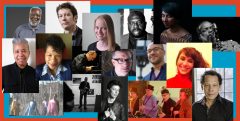 Isaiah Farahbakhsh – Reflections on the 2018 Guelph Jazz Festival Colloquium
Isaiah Farahbakhsh – Reflections on the 2018 Guelph Jazz Festival Colloquium
A Reflection from Emerging Scholar Isaiah Farahbakhsh, on the 2018 Guelph Jazz Festival Colloquium: Hovering at the Edge: Words, Music, Sound, and Song.
When reflecting on Guelph’s most recent jazz festival, the image my thoughts keep converging on is a concrete poem presented in the talk given by Meta DuEwa Jones. This poem from Giovanni Singleton’s collection Ascension contained text related to Alice Coltrane and her work. Although the words have left my memory, what remains is their arrangement in the shape of an analog clock. I do not remember where the hands lay, but perhaps that is fitting for an homage to Coltrane. When listening to her music, I am always drawn to the word “timeless.” Combining sounds (especially the ancient drone) of deep-rooted Indian classical music and space-age aesthetics within a contemporary framework of improvised music and jazz, an extra-terrestrial musicologist would have difficulty placing Coltrane’s music in the timeline of human creative endeavors. However, to a human ear, emergent qualities of this music hint at the distinct sound of the 70s, the decade when many of Coltrane’s seminal recordings were released. Now to have music that is both “timeless” and “of the times” seems paradoxical, yet the distinction between these words becomes blurry when time’s arrow is broken and time travel becomes a reality. By time travel, I mean that of the personal kind, where “backwards” travel is sparked by memory and “forwards” travel is fuelled by dreams. With this innate technology one can exist in multiple moments while still being physically “of the times” in their present date.
Not too long ago, I would have been very skeptical of this time travel as a reality, however through the practice of meditation, the nonlinearity of temporal existence has begun to enter my own paradigm. This practice was made possible through Alice Coltrane’s music since, from the beginning of my explorations in meditation, I would use her recording Journey in Satchidananda as a timekeeper. It would mark the end of my meditation in a both timeless and timely manner, gently bringing me into the present without disturbing the multiplicity of ineffable spaces. Talking to Jones, we came to this topic and she told me that she had a friend with a very similar experience: an experience I’m sure many others share. From there, we touched on the topic of time travel as a means of healing, a practice introduced to me by my sibling. With this practice, past traumas can be confronted using sensory stimuli, and legacies of healing can be accessed through our ancestors to aid in this process. I find these ideas are powerfully yet tenderly held in Coltrane’s music: a music that keeps time and transcends it simultaneously. We wind up a clock and expect time to travel forward as this potential energy is converted to the radial movement of the clock’s hands, however this release is rarely linear. Temporal journeys wind in and out of the present like spiralling chords strummed gracefully on a cosmic harp.
Inspired by the initiative developed by our friends and colleagues at the ArtsEverywhere Festival, and in partnership with the University of Guelph, the Emerging Scholars program offers scholars from all levels of study the opportunity to participate and engage with participants in our Colloquium program. They also receive complimentary attendance at two ticketed Guelph Jazz Festival performances, an intimate “Scholar’s Dinner” with Colloquium presenters, artists and participants, and an opportunity to publish their writing about their Festival and Colloquium insights on the IICSI website.







